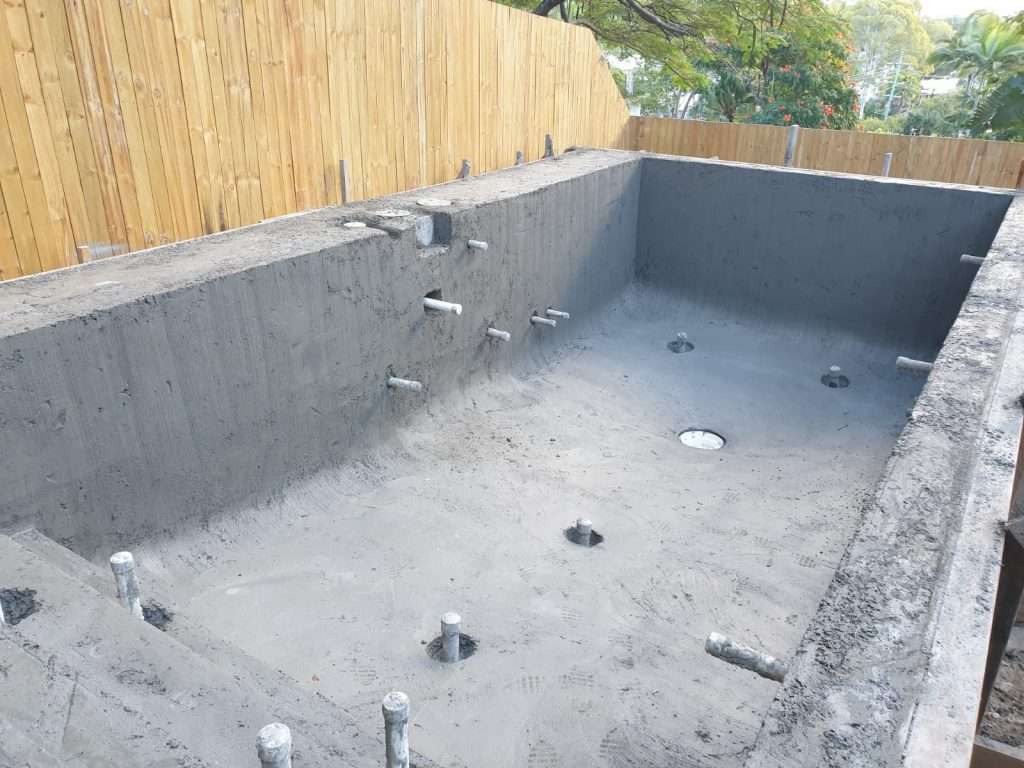So, you’re envisioning a backyard oasis, a private retreat for relaxation and fun? An above-ground concrete pool might be the perfect solution. Combining the robust durability of concrete with the streamlined installation of above-ground construction, these pools offer a unique blend of strength, longevity, and design freedom. This guide dives deep into everything you need to know about above-ground concrete pools, from initial design and construction to long-term maintenance and cost considerations. Let’s explore if this is the right choice for your dream backyard.
Designing Your Concrete Oasis
One of the most compelling advantages of above-ground concrete pools is their unmatched design versatility. Unlike pre-fabricated pools with limited options, concrete allows you to create a truly custom aquatic masterpiece. Imagine a freeform pool that gracefully curves through your landscaping, a sleek, modern rectangle, or even a unique shape that reflects your personal style.
- Shape: From classic rectangles to free-flowing organic forms, the shape of your pool is limited only by your imagination. Consider your existing landscape and desired aesthetic when making your choice.
- Size: Whether you envision a compact plunge pool for a quick dip or a spacious swimming area for family gatherings, you can tailor the size to perfectly suit your needs and backyard space.
- Depth: Customize the depth to accommodate various activities, from a shallow end for children’s play to a deeper area for diving. You can even incorporate varying depths for a more dynamic and versatile pool experience.
- Integrated Features: Elevate your pool with stunning built-in features. Imagine a cascading waterfall, a sun-drenched tanning ledge, or a soothing integrated spa. With concrete, the possibilities are virtually endless.
Building Your Dream: A Step-by-Step Guide
Constructing an above-ground concrete pool is a distinct process, differing from both traditional in-ground and above-ground pool installations. Here’s a simplified overview:
-
Foundation: A robust, level foundation, often comprised of reinforced concrete footings, is crucial. This ensures stability and supports the considerable weight of the pool structure and water. Proper engineering and soil analysis are essential in this foundational phase.
-
Framework and Reinforcement: A sturdy framework, typically made of wood or metal, defines the pool’s shape and size. Within this framework, steel reinforcing bars (rebar) are strategically placed to provide tensile strength and prevent future cracking.
-
Concrete Pouring: High-quality concrete is poured into the framework, ensuring a smooth, even surface. Vibration tools might be used to eliminate air pockets and ensure optimal concrete density and strength.
-
Finishing: Once the concrete cures, the finishing touches bring your vision to life. Options include smooth plaster, textured aggregate, vibrant tile, or specialized pool coatings. This stage also includes coping installation and the addition of features like waterfalls or lighting. Check out our guide on acid wash cement for stunning finish options.
-
Plumbing and Filtration: The final step involves installing the plumbing and filtration system. This crucial system keeps your water clean, clear, and circulating efficiently. Thorough testing is essential to ensure everything functions seamlessly. If you encounter issues with your anchor bolts, our guide on anchor bolts wont hold offers helpful solutions.
Cost Considerations: Planning Your Investment
Building an above-ground concrete pool is likely a more significant investment than a standard vinyl-lined above-ground pool. Factors influencing the cost include:
- Materials: Concrete, rebar, and finishing materials are inherently more expensive than vinyl liners.
- Labor: Construction typically requires specialized skills and equipment, leading to higher labor costs.
- Engineering: Structural engineering is essential for ensuring the pool’s integrity, adding to the overall expense.
While providing a precise cost estimate without specific project details is challenging, it’s best to anticipate a higher budget for a concrete pool. However, consider this a long-term investment that can significantly enhance your property value. Obtain multiple quotes from reputable pool contractors in your area for accurate cost estimations.
Maintenance: Keeping Your Oasis Sparkling
Maintaining an above-ground concrete pool shares similarities with in-ground concrete pool care. Regular cleaning, water chemistry balancing, and occasional resurfacing are essential. However, access for cleaning and maintenance might require extra planning, depending on the pool’s height. Consider incorporating features like strategically placed access panels or built-in steps during the design phase.
Comparing Your Options: A Clear Choice?
| Feature | Above Ground Cement Pool | In-ground Concrete Pool | Above Ground Vinyl Pool |
|---|---|---|---|
| Cost | Moderate to High | High | Low |
| Durability | Excellent | Excellent | Moderate |
| Design Flexibility | Excellent | Excellent | Limited |
| Construction Time | Moderate | High | Low |
| Maintenance | Moderate | Moderate | Moderate |
Weighing the Pros and Cons
Pros:
- Durability and Longevity: A concrete pool is built to withstand the elements and provide decades of enjoyment.
- Design Versatility: Create a pool that perfectly reflects your style and needs.
- Property Value: A well-maintained pool can be a valuable asset, potentially increasing your property value.
Cons:
- Initial Cost: The upfront investment is higher compared to other above-ground options.
- Construction Complexity: Building a concrete pool demands more specialized skills and planning.
- Maintenance Access: Reaching certain areas for maintenance might require additional effort depending on the pool’s height.
Making the Decision: Is it Right for You?
An above-ground concrete pool offers a unique combination of durability, design freedom, and lasting value. It’s an excellent choice for homeowners seeking the permanence of concrete without the extensive excavation required for an in-ground pool. However, carefully weigh the costs and complexities involved. Thorough planning, research, and multiple quotes from qualified contractors will empower you to make an informed decision.
Can an Above-Ground Pool Be Placed on Cement?
While technically feasible, placing a standard above-ground pool directly on a concrete slab presents potential challenges. Concrete doesn’t drain well, leading to moisture accumulation against the pool frame, which can cause rust. Additionally, the rough surface of concrete can abrade the pool liner, potentially causing leaks.
If you’re considering placing an above-ground pool on an existing concrete slab, take these precautions:
- Clean the Surface: Thoroughly clean the concrete, removing any debris that could damage the liner.
- Use a Pool Pad: A high-density pool pad is essential to protect the liner from abrasion and provide cushioning.
- Address Drainage: Ensure proper drainage away from the pool area to prevent water buildup. Consider sloping the surrounding area or installing French drains.
- Level the Pad: A perfectly level pool pad is crucial for even weight distribution and prevents the pool from leaning or sinking unevenly.
- Follow Manufacturer’s Instructions: Adhere to the specific instructions provided by your pool manufacturer.
Superior alternatives for a pool base include compacted gravel topped with sand, which offers excellent drainage, or a sand-only base, a more economical choice that may require periodic leveling. Analyze the long-term costs associated with each option, considering potential rust repair and liner replacement.
| Feature | Concrete Base | Alternative Base (Gravel/Sand) |
|---|---|---|
| Stability | Excellent | Very Good, especially when well-compacted |
| Drainage | Poor, requires additional measures | Excellent, natural drainage |
| Initial Cost | Potentially lower if slab exists; higher if new | Moderate; materials are generally less expensive |
| Maintenance | Potentially higher due to rust/liner issues | Lower |
| Lifespan | Potentially shorter due to rust/liner damage | Longer |
The optimal base for your above-ground pool depends on your individual circumstances, budget, and DIY skills. Ongoing research suggests new base materials and techniques may emerge, so stay informed about evolving trends in pool base technology.
Delving Deeper into Concrete Pools: Pros, Cons, and Lifespan
Concrete pools, whether in-ground or above-ground, offer a blend of advantages and disadvantages. Understanding these nuances is crucial for making an informed decision.
Pros of Concrete Pools:
- Design Customization: Concrete’s malleability allows for unparalleled design freedom, from freeform shapes to integrated features like waterfalls and tanning ledges.
- Durability and Longevity: Concrete pools are incredibly durable, capable of lasting decades, sometimes even generations, with proper care. In-ground pools, in particular, are known for their exceptional lifespan, often exceeding 50 years.
- Strength and Resistance: Concrete withstands harsh weather conditions and resists damage better than other pool materials.
- Enhanced Property Value: A well-maintained concrete pool can significantly increase your home’s market value.
Cons of Concrete Pools:
- High Initial Investment: Concrete pools are more expensive upfront than other types, due to material, labor, and engineering costs.
- Ongoing Maintenance: Concrete requires regular cleaning, chemical balancing, and occasional resurfacing, which can add up over time.
- Demanding Upkeep: Maintaining proper water chemistry and cleaning the pool can be more labor-intensive than with other pool types.
- Potential for Cracking: While proper construction minimizes this risk, cracking remains a possibility over the pool’s lifespan.
How Long Do Concrete Pools Last?
The lifespan of a concrete pool varies depending on several factors:
- Type: Above-ground concrete pools generally last 10-20 years, while in-ground pools can last 25-75 years or more with meticulous care.
- Construction Quality: High-quality materials and skilled workmanship are paramount for longevity.
- Maintenance Practices: Regular cleaning, balanced water chemistry, and prompt repairs significantly extend a pool’s lifespan. Regular professional inspections are highly recommended.
- Environmental Factors: Harsh climates and exposure to the elements can impact the pool’s lifespan, particularly for above-ground structures.
Investing in a concrete pool requires careful consideration of both the initial and long-term costs. While the upfront expense is higher, the potential for decades of enjoyment and increased property value makes it a worthwhile investment for many homeowners. Remember, ongoing research in pool materials and construction may lead to new innovations and further enhance the longevity of concrete pools in the future.
- How to Get Mustard Out of Clothes: A Complete Guide - April 26, 2025
- How to Get Motor Oil Out of Clothes: Proven Methods & Step-by-Step Guide - April 25, 2025
- How to Get Mothball Smell Out of Clothes: A Complete Guide - April 25, 2025










